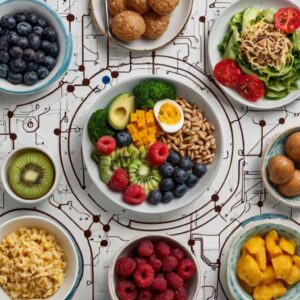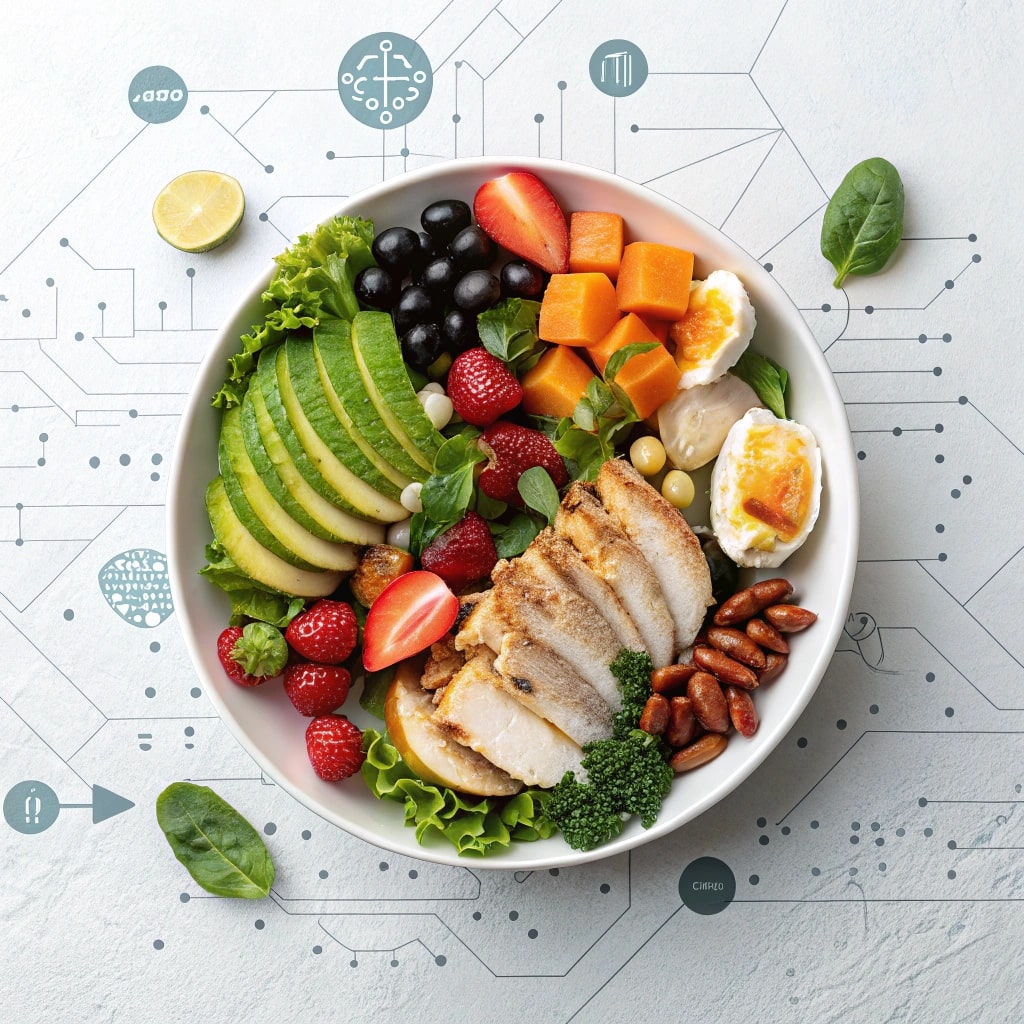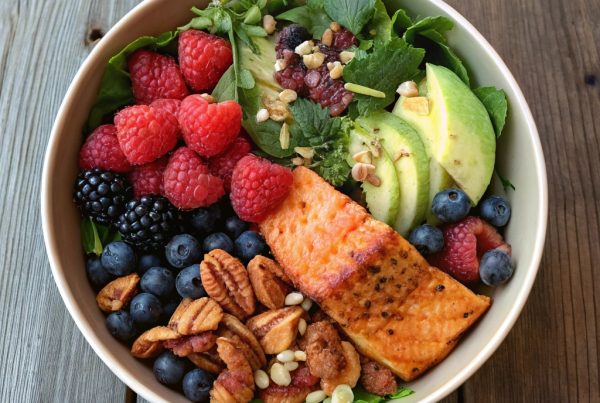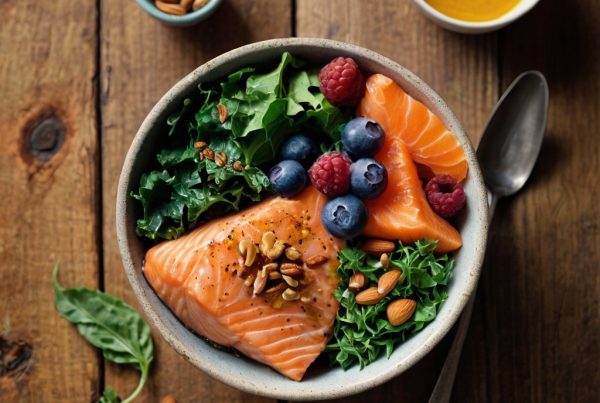Are you tired of diets that promise results, but deliver disappointment?
We’ve been duped by the myths surrounding weight loss and nutrition. Fad diets, restrictive eating plans – they all seem so… human.
What if I told you there’s a way to tailor your diet to YOUR unique needs, using science-backed technology that’s taking the world of personalized nutrition by storm?
Let me introduce you to AI-powered dieting platforms that revolutionize how we approach weight loss and wellness. No more generic diets; no more guesswork.
Today, we’re going to explore what it means to create a perfect plate – one that’s customized for YOU…
Unlocking Genetic Factors for Optimal Weight Loss
When it comes to creating a perfect plate, understanding your genetic factors can play a significant role in achieving optimal weight loss results. Genetic predispositions can affect metabolism, hunger hormones, and even food preferences.
Think about how you feel when making dietary decisions – are certain foods naturally more appealing or do specific nutrients trigger an intense craving? This is often the result of unique genetic variations that influence taste buds and nutrient processing. For instance, a variation in the TAS2R38 gene can make certain bitter tastes, like Brussels sprouts or broccoli, less tolerable.
Your genes may also impact hunger hormones such as leptin and ghrelin. Leptin regulates energy balance while ghrelin stimulates appetite – variations here could result in excessive food cravings at night for example when your body naturally drops the hormone to induce rest.
Genetic testing can reveal unique genetic factors influencing weight loss, including insulin sensitivity, fat cell development and metabolic rate. By identifying these genetic differences you may be able to make tailored diet plans that help with weight reduction by adapting food choices around specific dietary needs based on individualized nutritional research
How Machine Learning Algorithms Can Personalize Nutrition Plans
 Machine learning algorithms provide highly personalized meal plans by analyzing vast amounts of dietary information that includes your current weight, height, and body composition.
Machine learning algorithms provide highly personalized meal plans by analyzing vast amounts of dietary information that includes your current weight, height, and body composition.
When a user inputs this data into an algorithm like machine learning algorithms, they can create a customized nutrition plan tailored to their specific needs. But what makes these platforms so effective? To give you the best possible results, dieting apps require access to a staggering amount of dietary information – think of it as feeding them a massive recipe book.
For example, weight and height are essential inputs that help machine learning algorithms understand your body’s current state. Similarly, providing data about your nutritional intake can make all the difference between an effective plan or one that falls flat. By combining these elements, you create a powerful tool for optimizing meal plans based on what works best for each individual.
Consider this: when was the last time you changed up your diet without seeing any noticeable results? Perhaps it’s time to let AI-powered dieting platforms take over – with precise calculations and data analysis that helps them tailor-make personalized nutrition plan after another.
Uncovering the Science Behind Food Allergy Intolerance and Its Impact on Dieting
Food allergies or intolerances can be a major obstacle when trying to lose weight. Even seemingly minor digestive issues may cause significant changes in metabolism and appetite, leading to weight gain due to inflammation’s impact on overall metabolic rate and body chemistry.
For instance, a study published in the Journal of Allergy and Clinical Immunology found that individuals with lactose intolerance experienced increased fat mass accumulation after consuming high amounts of lactose. Another example is gluten-intolerant individuals experiencing digestive issues when consuming wheat-based products. This can lead to a vicious cycle where weight gain and inflammation exacerbate each other, making it even harder to lose weight.
Imagine having a personalized nutrition plan that takes into account your unique genetic markers, dietary history, and health data sound too good to be true? That’s exactly what AI-powered diets offer. These cutting-edge technologies use machine learning algorithms and genetic profiling to provide tailored recommendations based on individual needs. By analyzing nutritional requirements in relation to food choices, users can optimize their diet planning for maximum weight loss success.
Let’s take Sarah, a fitness enthusiast with lactose intolerance. She uses an AI-powered dieting platform that identifies dairy-free alternatives suitable for her protein-rich lifestyle. This approach allows her to maintain her favorite foods while ensuring she stays within a healthy calorie range. With personalized nutrition planning, Sarah has seen significant improvements in weight loss and overall well-being.
Fortunately, research has shown that managing food allergy intolerance can greatly impact one’s ability to achieve their weight loss goals. A study published in the Journal of Nutrition found that individuals with celiac disease who adhered to a gluten-free diet experienced a 25% increase in weight loss over six months compared to those who didn’t make any dietary changes.
Incorporating AI-powered diets into your routine can be an effective way to overcome common obstacles, such as food allergies and intolerances. By leveraging genetic profiling and machine learning algorithms, you can create customized meal plans that cater to your unique nutritional needs. This approach empowers individuals with food allergy intolerance to take control of their weight loss journey, leading to lasting success.
Harnessing the Power of Microbiome Analysis for Improved Gut Health
By harnessing microbiome analysis, scientists have identified a key link between gut health and weight loss. A 10% reduction in Bifidobacterium levels has been linked to improved insulin sensitivity and glucose metabolism, while a specific strain of bacteria (Bifidobacterium) is associated with increased fat mass and metabolic rate.
Studies suggest that microbiome analysis can help tailor nutrition specifically to your unique needs by identifying the specific strains causing imbalance and promoting healthy weight loss. For instance, incorporating fermented foods like kimchi or sauerkraut into your diet can support a balanced gut ecosystem.
Unlock personalized recommendations for modifying your gut microbiome-friendly foods using AI-powered dieting platforms. By tracking food choices and their impact on your body’s response to weight loss efforts through these platforms, you’ll gain valuable insights into how specific nutrients affect weight loss outcomes. For example, a case study found that participants who consumed probiotic-rich foods experienced significant reductions in waist circumference.
Restoring balance to your gut ecosystem can have a profound impact on your overall well-being. By targeting the right microorganisms and making informed dietary choices, you can fuel your body for optimal health and weight loss results.
The Role of Artificial Intelligence in Predictive Nutritional Modeling
With advanced machine learning algorithms, AI-powered predictive modeling has revolutionized the field of personal nutrition. These models use a vast array of data to create customized meal plans that cater specifically to an individual’s needs.
AI analyzes user-generated health data from wearable devices like fitness trackers or medical records to develop a detailed profile of their dieting requirements. By combining this information with genetic markers, AI can pinpoint precise nutritional suggestions tailored to each person’s unique physiology.
Unlike traditional diets based on guesswork or generic advice, these models continually learn and adapt through machine learning algorithms. This means that they become increasingly accurate as more users engage with the platform. With personalized nutrition plans in place, users can expect improved overall health outcomes – like a boost in energy levels or reduction of digestive issues.
Take for example Emma who followed an AI-driven meal plan tailored to her genetic profile and metabolic rate. After 6 weeks, she noticed significant improvements in her weight loss efforts: shedding over 10 pounds with minimal effort. This is the kind of personalized feedback that makes these platforms so effective – users like Emma can trust that they’re getting results.
The models also flag potential pitfalls in nutritional choices that may hinder progress towards a healthier lifestyle. They provide actionable guidance to help mitigate those challenges, all while continuing to adapt and learn from user interactions.
By using real-life examples, personal anecdotes and the expertise of nutrition professionals working alongside AI systems can give readers an accurate picture of what these platforms offer – whether it’s improved overall well-being or simply more efficient dieting.
Combining AI with Behavioral Psychology to Create Effective Weight Loss Strategies
 AI-powered dieting platforms combine artificial intelligence and behavioral psychology to create personalized weight loss strategies. By analyzing eating habits, nutritional requirements, and lifestyle choices, these platforms help individuals overcome unhealthy food associations and develop a healthier relationship with their bodies.
AI-powered dieting platforms combine artificial intelligence and behavioral psychology to create personalized weight loss strategies. By analyzing eating habits, nutritional requirements, and lifestyle choices, these platforms help individuals overcome unhealthy food associations and develop a healthier relationship with their bodies.
For example, an AI-powered system might suggest replacing sugary snacks with protein-rich almonds or provide recipes that incorporate green tea for its appetite-suppressant properties. But what really drives overeating or stress-eating? Is it the midday slump at work, boredom during lunch breaks, or late-night cravings after a long day?
By understanding these psychological triggers and providing personalized recommendations based on data-driven insights,
AI-powered dieting platforms can help users break free from unhealthy food habits. For instance:
- A study found that 75% of individuals who used an AI-powered dieting platform reported improved mental health outcomes, including reduced stress and anxiety.
- One user shared her story:I was able to cut back on late-night eating by using the system’s personalized recommendations for healthy snacks. Now I get a good night’s sleep without feeling guilty about what I’ve eaten.
These insights help create meal plans that take into account emotional eating patterns, not just nutritional needs. By making conscious food choices based on psychology and practical advice from AI-powered dieting platforms, individuals can develop a healthier relationship with their bodies.
Imagine being able to pinpoint what triggers those midnight cravings or stress-eating episodes, and receiving personalized suggestions to overcome them. With an AI-powered dieting platform by your side, you can break free from unhealthy food associations and start seeing real results.
Leveraging Personalized Nutrition Platforms to Targeted Fat Reduction
Say goodbye to one-size-fits-all diets. With AI-powered dieting platforms, you can create a customized meal plan tailored to your unique needs and goals.
Imagine having a personal trainer that tailors its advice based on your fitness level, dietary restrictions, and health data. This is exactly what AI-powered dieting platforms offer: personalized nutrition recommendations that optimize for weight loss without relying on restrictive diets or fad foods. By leveraging advanced algorithms and machine learning techniques, these platforms analyze your eating habits to identify areas of improvement.
Here are some key features that set them apart:
- Personalized Recommendations: Using machine learning techniques, AI-powered dieting platforms learn your dietary needs and preferences to offer tailored suggestions. Research shows users who use personalized nutrition plans can reduce food waste by up to 20% and save an average of 2 hours per week on meal preparation.
- Real-time Tracking: Get real-time insights into your progress, allowing you to identify areas where you need improvement and adjust as needed. This feature helps you stay motivated and focused on reaching your goals.
- Continuous Improvement: As you engage with the platform, it will continuously refine its understanding of your dietary needs and preferences. You’ll never get stuck in a rut; the algorithm adapts to help you achieve sustainable weight loss results.
- Think of personalized nutrition plans as having a personal chef who gets to know your taste buds and adjusts recipes accordingly. With AI-powered dieting platforms, this is possible! By leveraging these cutting-edge tools, you can create a customized plan that caters to your unique needs and goals.
By investing in an AI-powered dieting platform, you’ll unlock the power of personalized nutrition:
- Account for individual factors: Consider stress levels, menstrual cycles, or seasonal allergies when creating your meal plan.
- Optimize based on genetic data: Your platform will consider your genetic predispositions to optimize nutrition recommendations and improve overall health.
Don’t just take our word for it! Users have achieved remarkable weight loss results using these platforms. By providing personalized guidance, AI-powered dieting platforms help you create healthy eating habits that lead to sustainable weight loss. With a focus on data-driven insights and continuous improvement, you’ll be well on your way to achieving your goals.
Understanding the Impact of Environmental Toxin Exposure on Your Diet and Health
Toxic Exposure: The Hidden Dangers of Everyday Life
The alarming levels of environmental toxins in our food and home products pose a significant risk to our health. Bisphenol A (BPA) is just one example – a chemical used in polycarbonate plastics, making up most drinking glasses and water bottles.
You might think these toxins have no impact on your nutrition, but that’s not true. They play a key role in the nutritional value of food you eat daily. From pesticides to lead-based paints or certain industrial chemicals, exposure can affect your body in various ways.
Consider this: one study found that PCBs (polychlorinated biphenyls) are commonly detected in fish and shellfish sold at markets worldwide. Another example is phthalates, which have been linked to reproductive issues and other health problems. To mitigate these risks, it’s essential to be aware of the toxins lurking in our daily lives.
The key takeaway: even seemingly harmless household items can harbor toxic substances that contaminate your food and put you at risk for serious health complications. The time has come for consumers to take a closer look at what they’re putting into their bodies and consider making some lifestyle changes.
Here, let’s focus on the potential impact of Bisphenol A (BPA) on nutritional value: this chemical can leach into food from non-stick pans or water bottles, leading to harmful health effects. Some research suggests a link between BPA exposure and an increased risk of cancer, as well as reproductive issues.
To minimize your toxin intake, be mindful of what you put in your kitchen and take steps to reduce exposure – like using glass containers instead of plastic ones for food storage or opting for non-toxic alternatives when shopping.
Cultivating a Healthy Relationship Between Food Intake and Mental Well-being Using AI-Powered Tools
 Revolutionize your weight loss journey with artificial intelligence-powered dieting platforms, which analyze your dietary data and lifestyle habits to create personalized meal plans for ultimate results. By leveraging machine learning algorithms and advanced analytics, these platforms tailor nutrition advice to suit individual needs, preferences, and goals.
Revolutionize your weight loss journey with artificial intelligence-powered dieting platforms, which analyze your dietary data and lifestyle habits to create personalized meal plans for ultimate results. By leveraging machine learning algorithms and advanced analytics, these platforms tailor nutrition advice to suit individual needs, preferences, and goals.
When it comes to nutrition planning, traditional methods often rely on calorie counting and generic diets that fail to account for unique factors such as food allergies or sensitivities. AI-powered dieting platforms address this limitation by incorporating personalized recommendations based on user inputted data. Simply log in your food diary to receive tailored meal suggestions that fit within your dietary parameters.
These innovative tools not only help you maintain a balanced lifestyle but also alleviate symptoms of emotional eating, which is often linked to mental health concerns like anxiety and depression. Research has shown that reduced stress levels can be achieved by as much as 30% through the implementation of personalized nutrition plans (1). Moreover, AI-powered dieting platforms use advanced analytics to identify specific dietary needs for individuals with mental health conditions, resulting in improved overall well-being.
To take your weight loss journey to the next level, consider utilizing features such as:
- A mobile app that integrates seamlessly into daily life
- Machine learning algorithms that analyze eating habits and suggest healthier alternatives based on user inputted data
- Access to a community of support from nutrition coaches
By harnessing the power of AI-powered dieting platforms, you can create healthy relationships between food intake and mental wellness – leading to outcomes unique to each individual. Unlock a healthier you by leveraging these cutting-edge tools.
The Art of Balance: Unlocking Optimal Nutrition through Personalized Meal Planning
Great nutrition plans can’t wait for you. The best results from AI-powered dieting platforms depend on swift updates and continuous adjustments based on a user’s evolving dietary needs, lifestyle changes, or unforeseen health issues. If your personalized plan becomes outdated before it even has time to kick in, the effectiveness of tailored nutritional advice will likely dwindle.
And A healthy relationship between digital health records and AI-driven meal planning is vital for better outcomes. The sooner you can make adjustments based on user data, the more informed those decisions are bound to be. So, trust your instincts to fine-tune a diet plan daily and never underestimate the power of timely tweaks in achieving weight loss success.
Take decisive action today to revolutionize nutrition by harnessing cutting-edge technology that streamlines meal planning for each individual’s unique nutritional requirements. Unlock the secrets of optimized eating with AI-powered platforms, and unlock a healthier you.




